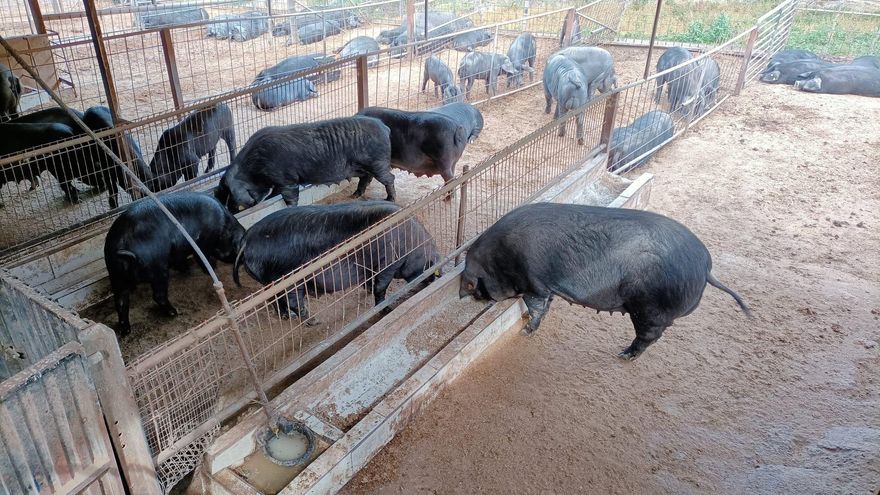
Between extinction and trendy gourmet product. The black pig, the only native breed in the Canary Islands, lives in a delicate balance. Production in the Islands is limited, with only about 3,500 specimens, and the demand is increasing. Farmers are delighted with the success of the product, but they fear going overboard and eventually not being able to meet the demand surge. “We need to increase production because demand is growing, and what we can’t do is promote consumption and then not have the product available,” says the president of the Black Pig Breeders Association of the Canary Islands, Jesús Marrero.
However, increasing production is not an easy task; the sector faces challenges like rising input costs or lack of generational turnover. Issues that, coupled with the slower development of the black pig compared to other breeds, complicate the breeding of specimens. Industrial pigs gain up to 100 kilograms in five months, while black pigs only gain 80 kilograms in ten months. “It’s a pig that takes time to develop,” explains Marrero, noting that specimens are usually sold when they reach 70 kilograms.
What makes this meat special? The juiciness it gains from slow breeding. The expert explains that black pigs have more fat than other breeds, and it infiltrates the lean meat like with Iberian pigs, giving the meat more juiciness. “Regular pigs don’t even provide cracklings, they grow a lot and very quickly, which is the difference with the Canarian breed,” adds Marrero. To develop properly, black pigs are fed ripe bananas, seasonal fruits, nuts, and feed.
The result of the slow growth process is a more flavorful meat that is gaining more followers. “Right now, it’s a gourmet product, it’s been trendy for two years, and many chefs are already opting for this meat to include in their dishes,” says the president of the breeders’ association. Last weekend, the II Canary Black Pig Pinolere Fair was held in Tenerife, showcasing the success the product is having in the Archipelago. “We sold out everything, we put up a pig for tasting, and it lasted only as long as it took to cut,” says Marrero. The same has happened at the recent gastronomic fairs held on the Peninsula, such as Madrid Fusión. Hamburgers, meatballs, sausages, and black pudding are just some of the products obtained from this breed that are most popular.
50 farms
[–>
Currently, there are around 50 farms that breed the native breed in the Archipelago, mostly concentrated on Tenerife, Gran Canaria, and Fuerteventura. These three islands account for 82% of the existing specimens. According to explanations from the breeders’ association, production has grown significantly in Fuerteventura in recent years, linked to cheese production. “Due to the large number of goats and a lot of cheese production, the waste produced serves as feed for black pigs, which farmers take advantage of,” he explains. In contrast, Gran Canaria has experienced a decline in recent years. In just one year, from 2022 to 2023, the island lost 600 heads. A situation that Marrero links to the increasing cost of inputs.
The number of specimens in the Islands fluctuates because new births and slaughters are recorded every week, and the association is working intensively to gain new members, as they acknowledge that they are “not having a good time.” “After the pandemic and the Ukraine war, we endured many difficulties, we were tight, but the subsidies from the councils and the Government of the Canary Islands were a huge help,” he points out. However, the sector is in a much better position than in the 1980s when the breed was on the verge of extinction because there were only 80 specimens and 20 mothers in the entire community.
Now, the breed is more stable, and farmers are in control of their productions. Another characteristic that sets the black pig apart from other pigs is its resistance to temperature changes, as experts point out it is a hardy pig. The bristles on the specimens allow the animal to withstand both cold and heat very well, making it a “very strong” breed. “White pigs cannot withstand the sun and need to be housed,” notes Marrero.
The association is currently striving to combat intrusion in the sector and to cease the sale of other breeds as black pigs in the Canary Islands. They are working with farmers and slaughterhouses to have complete traceability of the animals. They have already submitted documentation to the Government of the Canary Islands to obtain the “100% native breed” seal, which will require all black pig products sold in the Islands to have a distinct label, just like Canarian bananas.
As for the foreign market, it is still an untravelled path. “We don’t have much production, and for now, the market we have under control is in the Canaries,” admits Marrero, explaining that many chefs from the Archipelago and the Peninsula place occasional orders for the product to include in their recipes.
[–>
One of the pending tasks for farmers is to inspire the new generations to fall in love with the breed and continue the legacy. There are currently not many young people interested in the sector, which is why the association is working with students from some schools on the Islands, training them on farms through internship programs. “There are some who are enthusiastic, and that is essential because if there are no new generations, this will end in a few years,” laments Marrero, stating that the organization is willing to provide black pigs to these new farmers to start their work.
Subscribe to continue reading
















